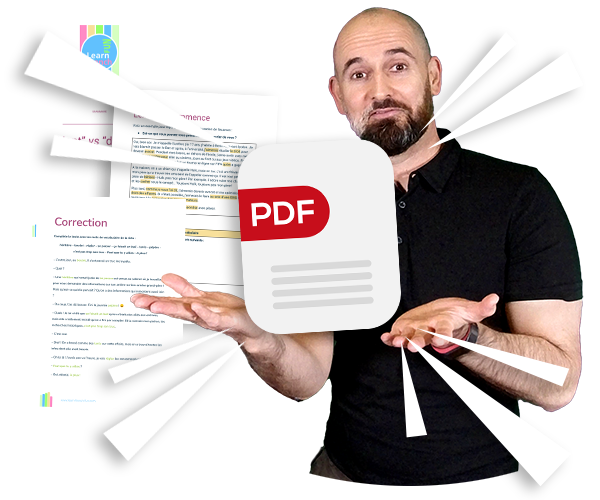No, idiotism is not the science of idiots!
An idiom (idiotism) is a construction, a locution specific to a language and generally difficult to translate into another language. It is also a phenomenon of linguistic borrowing: a word from another language arrives and settles in the French language.
- What is an idiom in French?
- Specific French idioms borrowed from the German language
- Specific French idioms borrowed from the English language
- And… the idiotisms specific to the French language, then?
- Part 1: Grammatical Gallicisms
- French impersonal expressions
- Part 2: Lexical Gallicisms
- Idiotisms in French idioms
I will explain all this to you and give you many examples.

PDF Bonus
We have prepared a free PDF to help you understand and master the gallicism, anglicism, germanism in French language.
👉 Download it for free
At the end, you will have exercises to practice with the correction. 👍
What is an idiom in French?
Just so you know, an idiom is a construction, a locution specific to a language and generally difficult to translate into another language. In any case, we won’t be able to translate an idiom word for word, we’ll have to get around the obstacle, rephrase, move away from the vocabulary to find the meaning.
Idioms are therefore untranslatable specificities of a given language. They are also phenomena of linguistic borrowing: there are words, grammatical or lexical expressions, which travel from one language to another. And the French language has been enriched throughout its history by these idioms borrowed from German, English, Arabic, and 1,000 other languages!
Today, I propose to observe these linguistic chameleons. But before you do, don’t forget to download the little PDF Bonus, for more explanations, more examples, more exercises.
Are you ready? Let’s go! Attacking the language chameleons.
Do you like learning French with videos?
Receive our free video newsletter every Friday in your e-mail box. You will get 3 “Tips & Tricks” on grammar, vocabulary, phonetics or French culture.
👉👉 Sign up now!
Specific French idioms borrowed from the German language
An idiom specific to the German language is called a Germanism. Wanderlust, Schadenfroh or Zeitgeist are very nice Germanisms that we don’t translate into French, we keep them as they are.
Of course, these three words belong to a sophisticated, sustained language.

But other words are used in a common level, for example un bunker or le leitmotiv.
And a little anecdote about a Germanism with a funny story: do you know what a vasistas is in French?
Today, a vasistas is a window in the roof of a house. The word comes from the German expression “Was ist das?” (What is it?).
In 1798, when the word entered the Dictionary of the French Academy, it meant an opening in the door of a house, an opening that allowed one to see who was the visitor.
And the expression “Was ist das?” corresponded to the French expression Vous désirez ? or C’est à quel sujet ?.
Specific French idioms borrowed from the English language
An idiom specific to the English language is an anglicism: there are thousands of them in French: week-end, jogging, stress, business, dress code, hipster, loser, cool, live…

Be careful with the pronunciation. If you pronounce anglicisms with a (good) English accent, you won’t be understood in France AND you’ll sound like a snob!
The French have also created some monsters: they tamper with the English word to make it French… for example, to picnic becomes pique-niquer in French, as well as le pique-niqueur, and his wife, la pique-niqueuse.
But my favorite anglicism, my favorite of all categories, is le talkie-walkie. Cute, isn’t it ? What do you mean it doesn’t exist ? Of course it does, and it’s French, check it in the dictionary !
Well in English, un talkie-walkie is walkie-talkie, but who cares !
And… the idiotisms specific to the French language, then?
They are called francismes, right? But, no, of course not! That would be too easy, and don’t forget this N°1 axiom of the French language:
Why make it simple when you can make it complicated?
The idioms of French are gallicisms (from the Latin gallicus, which means Gaul). You know Asterix the Gaul, don’t you? The Gauls were the ancestors of the French. A gallicism is therefore a typical turn of phrase in the French language. Here is what I suggest you work on now.
We will see 2 types of gallicisms : grammatical gallicisms and lexical gallicisms.
Part 1: Grammatical Gallicisms
Est-ce que… ?
Let’s take it easy: the first grammatical gallicism I’m proposing to you is quite simple, it’s the locution est-ce que.
In two YouTube lessons, I introduced you to the structures used to ask a question in French and, as you probably know, est-ce que allows you to ask a common question in French. Common, meaning used orally and grammatically correct.
How to translate word for word in your language:
- Est-ce que tu as bien tout compris ?
(Did you understand everything?) - Pourquoi est-ce que tu ne t’es pas encore abonné à notre chaîne YouTube?
(Why haven’t you subscribed to our YouTube channel yet?)
Est-ce que is just a tool to allow you to ask a common question, but in itself, this expression is useless… That’s what makes it so charming and beautiful, don’t you think?
Il y a
Another Gallicism, the expression il y a. This expression can be found in different forms, and in many contexts, for example :
- Il y avait autrefois un roi et une reine qui n’avaient pas d’enfant.
(Once upon a time there was a king and a queen who had no children = there was once a king…)
- Il y a 20 ans qu’il vit ici.
(He has lived here for 20 years.)
- Il y a 20 ans, il vivait ailleurs…
(20 years ago, he lived somewhere else…) = a date in the past: it’s 2022, so 20 years ago, in 2002, he lived somewhere else, not here.
- Qu’est-ce qu’il y a ? = qu’est-ce que tu veux ? = qu’est-ce qui se passe ?
(What’s up? = what do you want? With a note of irritation in the voice, or simply to know: what’s going on?)
- Il y a 500 000 personnes qui vivent sur la Côte d’Azur.
(There are 500,000 people living on the Côte d’Azur.) The descriptive expression
French impersonal expressions
S’il te plaît (please), and a whole series of impersonal expressions are grammatical gallicisms:
- il se peut… (it may be)
- il vaut mieux… (it is better)
- il faut… (it is necessary)
- ça te dirait… (would you like to)
- ça vaut la peine… (it is worth it)
- Plaît-il ? (Sorry?)
Avoir beau
Last example of grammatical gallicism, the locution avoir beau which is always followed by the infinitive.
Do you understand the sentence:
- Elle avait beau travailler dur, elle échouait à tous ses examens.
(No matter how hard she worked, she failed all her exams.)
First of all, be careful, avoir beau has nothing to do with beauty. In this sentence, there is a contradiction of terms: she works hard – she fails. That’s not very logical!
She should succeed with such a work! Well, no…
You could rephrase the sentence:
- Bien qu’elle travaille (subjonctif) dur, elle échouait.
- Même si elle travaillait dur, elle échouait.
Part 2: Lexical Gallicisms
We could classify in this category some adjectives that change their meaning by changing their place. For example:
- un homme brave and un brave homme,
- un homme grand and un grand homme.
What you have to keep in mind is that normally, adjectives are placed after the noun in French.
And so, in these expressions, the normal place will also be the normal idea of the vocabulary:
- Un homme brave is a man who has bravery, another word for courage. A brave man is not a coward, he is courageous. The adjective is in its normal place (behind the noun), so we have the normal idea, the proper meaning of the adjective.
- Un brave homme is a man who is honest and kind. in the south of France, depending on how the sentence is pronounced, this is not positive: he is kind, too kind, a little naive, even stupid.
The adjective brave is in front of the noun, it is not its normal place, and it is therefore a figurative, metaphorical meaning.
- Un homme grand: normal place and proper meaning: he is 2,10m, he is tall!
- Un grand homme: abnormal place and figurative sense: it is a personality that one admires, a hero, a historical character.
Idiotisms in French idioms
There are many idioms among idiomatic expressions, and they exist in all languages. They add color and flavor to a language and are often impossible to translate literally.
Here is a small personal selection of 5 French idiomatic expressions, it’s up to you to find their meaning:
1. Nadia a le cafard.
2. C’est comme pisser dans un violon.
3. Gérard est une poule mouillée
4. L’ancien président de la république vient de casser sa pipe.
5. Je t’ai déjà dit que tu devais mettre de l’eau dans ton vin.
If you have any doubts to understand them, download the Little Bonus PDF, you will find the explanation.
So, there you have it! A comprehensive guide to French idioms. Some of which are borrowed from the English and German languages, while others are specific to the French language.
Keep in mind that these expressions should be used sparingly in order to avoid looking like a complete idiot. And, as always, practice makes perfect!
Have you tried using any of these French idioms in your conversations? Do you have a favorite expression that we didn’t mention? Let us know in the comments below.
À bientôt !





